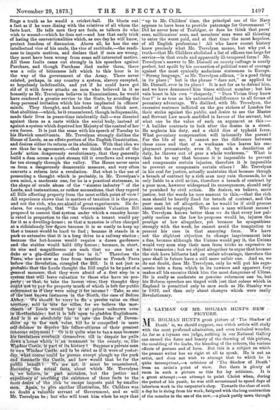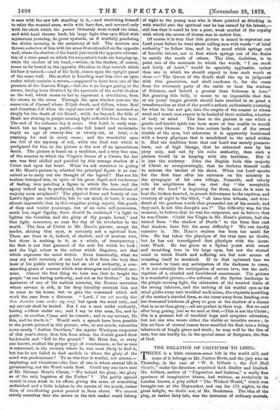A LAYMAN ON MR. HOLMAN •HUNT'S NEW PIOTURItl.
ER. HOLMAN HUNT'S great picture of ' The Shadow of Death.' is, we should suppose, one which artists will study with the most profound admiration, and even technical wonder. As far as a layman can judge, nothing in our National Gallery can exceed the force and beauty of the drawing of this picture, the moulding of the limbs, the blending of the colours, the various effects of posture and of form. l3ut this is a subject on which the present writer has no right at all to speak. He is not an artist, and does not wish to attempt that to which he is (pito incompetent,—a criticism of The Shadow of Death ' from an artist's point of view. But there is plenty of room in such a picture as this for lay criticism. It is a great attempt;—.an attempt to paint Christ when, during the period of his youth, he was still accustomed to spend days of laborious work in the carpenter's shop. Towards the close of such a day he is rising from his work, fatigued with the long contraction of the muscles in the use of the saw,—a plank partly sawn through is seen with the saw left standing in it,—and stretching himself to relax the wearied arms, while with bare feet, and covered only 'with the cloth which the poorer Orientals wear round the loins, and with head thrown back, his large light-blue eyes filled with mysterious yearning, he gazes upwards, as if wistfully pondering the divine meaning in the monotony of toil. The western sun throws a shadow of him with his arms thus extended on the opposite wall, where the shadow of the hands just touch the opposite extremi- ties of a cross panel on which his carpenter's tools are hanging up, while the shadow of his head,—which, in the shadow, of course, seems to be bowed in the opposite direction to that towards which his face is turned,—and of the body, comes upon the upright panel of the same wall. His mother is kneeling near him over an open casket which contains a crown,—supposed to have been one of the presents of the Eastern Kings,—but she is no longer gazing at the crown, having been diverted by the spectacle of the awful shadow on the wall, which seems to her to represent a crucifixion, from the crown to the cross. Through the open window you see the mountain of Carmel where Elijah dwelt, and Gilboa, where Saul and Jonathan fell when the royal ancestor of Christ mourned so deeply for the death of his friend ; while far beyond, the hills of Moab are shining in purple evening light reflected from the west. The end of the toilsome day is come. Our Lord, in early man- hood, but no longer a youth,—the full beard and moustache imply an age of twenty-five or twenty-six, at least, — is yearning for rest in every sense ; and the wonderful eyes are full of the mystery of toil, while the final rest which is prefigured for him in the picture is the rest of an ignominious death. The picture is based on a tradition, and a very fine one, of the manner is which the Virgin's dream of a Crown for her son was first chilled and purified by this strange shadow of a -Cross cast upon her heart. What we ask ourselves in gazing at Mr. Hunt's picture is, whether the principal figure is so con- ceived as to carry out the thought of the legend ? Has not his realism betrayed him, in spite of his great depth and tenderness of feeling, into painting a figure in which the love and the agony indeed may be prefigured, but in which the associations of majesty seem misplaced? The physical force and beauty of our Lord's figure are undeniable, but to our mind, at least, it seems almost impossible that in this sanguine young mystic, this youth of deep and tender yearnings, but of no calm self-possession, much less, regal dignity, there should be enshrined " a light to lighten the Gentiles, and the glory of thy people Israel," and that light, moreover, so near the day of its revelation to the world. The face of Christ in Mr. Hunt's picture, except the tender, shining blue eyes, is certainly not a spiritual face. There are lines in it, indeed, of shadow, and of anxious awe, but there is nothing in it, as a whole, of transparency ; the flesh is not that garment of the soul for which we look ; and the high colour is the colour which disguises, not that which expresses the mind within. Even historically, what we may say with certainty of our Lord is that from the very first hour of his public ministry be had an air of authority, a com- manding grace of manner which won strangers and subdued ene- mies. Almost the first thing we hear was that he taught the people "as one having authority, and not as the Scribes." In the narrative of one of his earliest miracles, the Roman centurion whose servant is sick, in his deep humility entreats him not to oome to his house, but to give the command which will work the cure from a distance. " Lord, I am not worthy that thou shouldst come under my roof, but speak the word only, and my servant shall be healed. For I tun a man under authority, having soldiers under me ; and I say to this man, Go, and he goeth ; to another, Come, and he cometh ; and to my servant, Do -this, and he doeth it." Would such a speech have been possible to the youth painted in this picture, who, to our minds, resembles more nearly " Joshua Davidson," the mystic Wesleyan carpenter of this year's story, than him from whom the Jewish guard drew backwards and "fell to the ground." Mr. Hunt has, as every one knows, studied the proper type of countenance, so far as race is concerned, in the country where he was most likely to find it, but has he not failed to find models in whom the glory of the mind was predominant ? To us this face is wistful, not serene,— imploring, not victorious—the face of one in whom eternal life is germinating, not the Word made flesh. Could any one have said of Mr. Holman Hunt's Christ, " We beheld his glory, the glory as of the only begotten of the Father " ? The partly opened mouth is even weak in its effect, giving the sense of something unfinished and a little helpless in the nature of the youth, rather than of overflowing power poured in from above. We cannot satisfy ourselves that the crown in the rich casket could belong of right to the young man who is there painted as drinking in with wistful awe the spiritual rest he has earned by his labowl,— still less that it could be but a poor, weak symbol of the royalty with which the crown of thorns was to endow him.
Of course it is true that this pictare is meant to represent our Lord years before he went about calling men with words " of brief authority" to follow him, and in the mood which springs out of humble labour, not in that which springs out of the desire to satisfy the needs of others. The idea, doubtless, is to paint one of the moments to which the words, "I am meek and lowly of heart," would be specially applicable, rather than one in which we should expect to hear such words as these :—" The Queen of the South shall rise up in judgment with this generation, and shall condemn it, for she came from the uttermost parts of the earth to hear the wisdom of Solomon, and behold a greater than Solomon is here." But granting this fully, it seems to us impossible that five or six years' longer growth should have resulted in so great a transformation as that of the youth's ardent, enthusiastic yearning for what he has not got, into the empire of the master at whose word and touch men expect to be healed of their maladies, whether
of body or mind. The face in the picture is one which a gentle and tender spirit has been more or less unable to mould to its own likeness. The true nature looks out of the sweet trouble of the eyes, but otherwise it is apparently burthened with a heavy physique that is unsubdued to the mind within it. Had the tradition been that our Lord was merely peasant- born, not of high lineage, that he attracted men by his piety only, and not by his calm authority, then such a picture would be in keeping with the tradition. But • it is just the contrary. John the Baptist feels this majesty of Christ so overpoweringly, that he declares himself unfit to unloose the latchet of his shoes. When our Lord• speaks for the first time after his entrance on his ministry in the synagogue of his own village, Nazareth, and calmly tells his neighbours that on that day " the acceptable year of the Lord" is beginning for them, since he is sent to heal the broken-hearted, to preach deliverance to the captives, and recovery of sight to the blind, " all bare him witness, and won- dered at the gracious words that proceeded out of his mouth, and they said, Is not this Joseph's son ?" The difficulty was, for the moment, to believe that he was the carpenter, not to believe that he was Christ. Could the Virgin in Mr. Hunt's picture, had she turned from " the shadow of Death " to the form that cast that shadow, have felt the same difficulty ? We can hardly conceive it. Mr. Hunt's realism has been too mach for him. He has taken the physique of the true race no 'doubt, but he has not transfigured that physique with the incar- nate Word. He has given us a Syrian youth with sweet and trembling love in his large eyes, but not the eternal mind to which Death and suffering are but new means of revealing itself to mankind. If in that upturned face we are meant to trace any anticipation of the darkness to come, it is not certainly the anticipation of serene love, bat the anti- cipation of a clouded and bewildered amazement. The picture is a wonderful picture,—the softness of the Syrian landscape in the purple evening light, the relaxation of the wearied limbs of the strong labourer, and the melting of his wistful eyes as his mind glides away into troubled meditation, the exquisite moulding of the mother's startled form, as she turns away from bending over her treasuredlmirloom of glory to gaze at the shadow of a shame that is more than glory,—all are perfect in their way. But we said after long gazing, plat as we said at first,—This is not the Christ ; this is a peasant full of troubled hope and sanguine adoration, but not one who wears either the visible or invisible crown ; in him no lines of eternal reason have moulded the flesh into a living tabernacle of kingly grace and truth ; he may well be the Son of man, but can hardly be, in the special sense of Scripture, the Son of God.







































 Previous page
Previous page